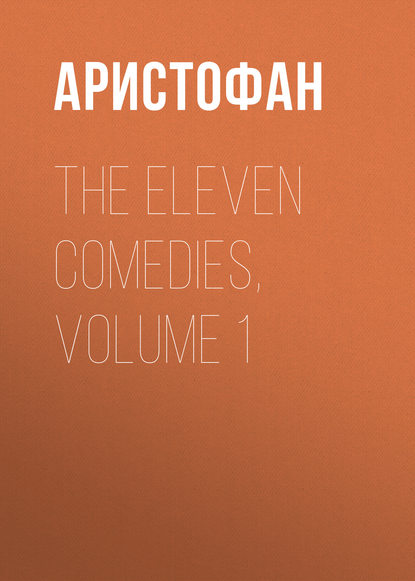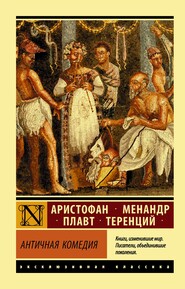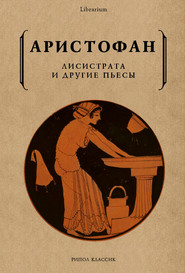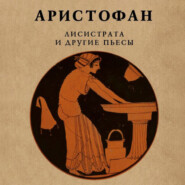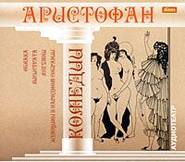По всем вопросам обращайтесь на: info@litportal.ru
(©) 2003-2024.
✖
The Eleven Comedies, Volume 1
Автор
Год написания книги
2018
Настройки чтения
Размер шрифта
Высота строк
Поля
DICAEOPOLIS. My round cheese-cake.
LAMACHUS. What clumsy wit!
DICAEOPOLIS. What delicious cheese-cake!
LAMACHUS. Pour oil on the buckler. Hah! hah! I can see an old man who will be accused of cowardice.
DICAEOPOLIS. Pour honey on the cake. Hah! hah! I can see an old man who makes Lamachus of the Gorgon's head weep with rage.
LAMACHUS. Slave, full war armour.
DICAEOPOLIS. Slave, my beaker; that is my armour.
LAMACHUS. With this I hold my ground with any foe.
DICAEOPOLIS. And I with this with any tosspot.
LAMACHUS. Fasten the strappings to the buckler; personally I shall carry the knapsack.
DICAEOPOLIS. Pack the dinner well into the basket; personally I shall carry the cloak.
LAMACHUS. Slave, take up the buckler and let's be off. It is snowing! Ah! 'tis a question of facing the winter.
DICAEOPOLIS. Take up the basket, 'tis a question of getting to the feast.
CHORUS. We wish you both joy on your journeys, which differ so much. One goes to mount guard and freeze, while the other will drink, crowned with flowers, and then sleep with a young beauty, who will rub his tool for him.
I say it freely; may Zeus confound Antimachus, the poet-historian, the son of Psacas! When Choregus at the Lenaea, alas! alas! he dismissed me dinnerless. May I see him devouring with his eyes a cuttle-fish, just served, well cooked, hot and properly salted; and the moment that he stretches his hand to help himself, may a dog seize it and run off with it. Such is my first wish. I also hope for him a misfortune at night. That returning all-fevered from horse practice, he may meet an Orestes,[260 - An allusion to the paroxysms of rage, as represented in many tragedies familiar to an Athenian audience, of Orestes, the son of Agamemnon, after he had killed his mother.] mad with drink, who breaks open his head; that wishing to seize a stone, he, in the dark, may pick up a fresh stool, hurl his missile, miss aim and hit Cratinus.[261 - No doubt the comic poet, rival of Aristophanes.]
SLAVE OF LAMACHUS. Slaves of Lamachus! Water, water in a little pot! Make it warm, get ready cloths, cerate, greasy wool and bandages for his ankle. In leaping a ditch, the master has hurt himself against a stake; he has dislocated and twisted his ankle, broken his head by falling on a stone, while his Gorgon shot far away from his buckler. His mighty braggadocio plume rolled on the ground; at this sight he uttered these doleful words, "Radiant star, I gaze on thee for the last time; my eyes close to all light, I die." Having said this, he falls into the water, gets out again, meets some runaways and pursues the robbers with his spear at their backsides.[262 - Unexpected wind-up of the story. Aristophanes intends to deride the boasting of Lamachus, who was always ascribing to himself most unlikely exploits.] But here he comes, himself. Get the door open.
LAMACHUS. Oh! heavens! oh! heavens! What cruel pain! I faint, I tremble! Alas! I die! the foe's lance has struck me! But what would hurt me most would be for Dicaeopolis to see me wounded thus and laugh at my ill-fortune.
DICAEOPOLIS (enters with two courtesans). Oh! my gods! what bosoms! Hard as a quince! Come, my treasures, give me voluptuous kisses! Glue your lips to mine. Haha! I was the first to empty my cup.
LAMACHUS. Oh! cruel fate! how I suffer! accursed wounds!
DICAEOPOLIS. Hah! hah! hail! Knight Lamachus! (Embraces Lamachus.)
LAMACHUS. By the hostile gods! (Bites Dicaeopolis.)
DICAEOPOLIS. Ah! great gods!
LAMACHUS. Why do you embrace me?
DICAEOPOLIS. And why do you bite me?
LAMACHUS. 'Twas a cruel score I was paying back!
DICAEOPOLIS. Scores are not evened at the feast of Cups!
LAMACHUS. Oh! Paean, Paean!
DICAEOPOLIS. But to-day is not the feast of Paean.
LAMACHUS. Oh! support my leg, do; ah! hold it tenderly, my friends!
DICAEOPOLIS. And you, my darlings, take hold of my tool both of you!
LAMACHUS. This blow with the stone makes me dizzy; my sight grows dim.
DICAEOPOLIS. For myself, I want to get to bed; I am bursting with lustfulness, I want to be fucking in the dark.
LAMACHUS. Carry me to the surgeon Pittalus.
DICAEOPOLIS. Take me to the judges. Where is the king of the feast? The wine-skin is mine!
LAMACHUS. That spear has pierced my bones; what torture I endure!
DICAEOPOLIS. You see this empty cup! I triumph! I triumph!
CHORUS. Old man, I come at your bidding! You triumph! you triumph!
DICAEOPOLIS. Again I have brimmed my cup with unmixed wine and drained it at a draught!
CHORUS. You triumph then, brave champion; thine is the wine-skin!
DICAEOPOLIS. Follow me, singing "Triumph! Triumph!"
CHORUS. Aye! we will sing of thee, thee and thy sacred wine-skin, and we all, as we follow thee, will repeat in thine honour, "Triumph, Triumph!"
* * * * *
FINIS OF "THE ACHARNIANS"
* * * * *
PEACE
INTRODUCTION
The 'Peace' was brought out four years after 'The Acharnians' (422 B.C.), when the War had already lasted ten years. The leading motive is the same as in the former play—the intense desire of the less excitable and more moderate-minded citizens for relief from the miseries of war.
Trygaeus, a rustic patriot, finding no help in men, resolves to ascend to heaven to expostulate personally with Zeus for allowing this wretched state of things to continue. With this object he has fed and trained a gigantic dung-beetle, which he mounts, and is carried, like Bellerophon on Pegasus, on an aerial journey. Eventually he reaches Olympus, only to find that the gods have gone elsewhere, and that the heavenly abode is occupied solely by the demon of War, who is busy pounding up the Greek States in a huge mortar. However, his benevolent purpose is not in vain; for learning from Hermes that the goddess Peace has been cast into a pit, where she is kept a fast prisoner, he calls upon the different peoples of Hellas to make a united effort and rescue her, and with their help drags her out and brings her back in triumph to earth. The play concludes with the restoration of the goddess to her ancient honours, the festivities of the rustic population and the nuptials of Trygaeus with Opora (Harvest), handmaiden of Peace, represented as a pretty courtesan.
Such references as there are to Cleon in this play are noteworthy. The great Demagogue was now dead, having fallen in the same action as the rival Spartan general, the renowned Brasidas, before Amphipolis, and whatever Aristophanes says here of his old enemy is conceived in the spirit of 'de mortuis nil nisi bonum.' In one scene Hermes is descanting on the evils which had nearly ruined Athens and declares that 'The Tanner' was the cause of them all. But Trygaeus interrupts him with the words:
"Hold—say not so, good master Hermes;





